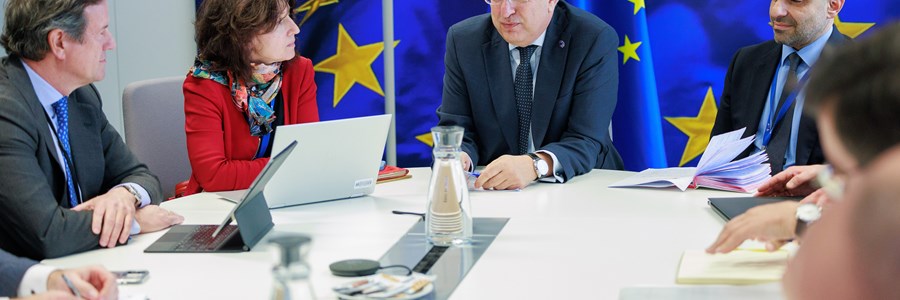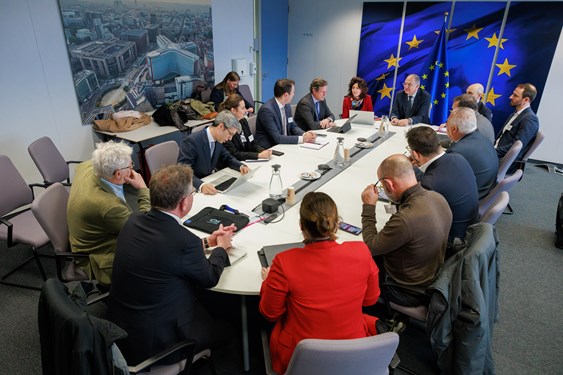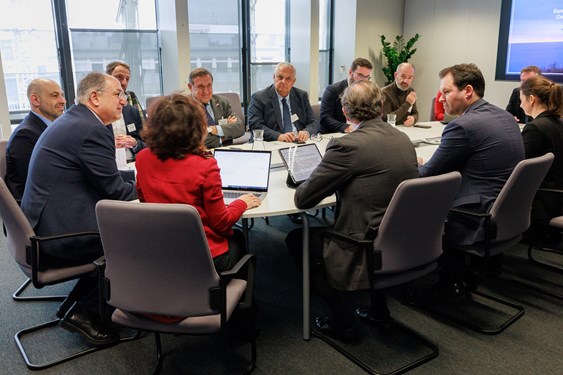Europêche welcomes Commissioner Kadis commitment to supporting the EU fishing sector

Europêche, the leading representative body for the fishing industry in Europe, held a first meeting yesterday with Commissioner Kadis to address the future of the EU fisheries sector under the legislative term 2024-2029. The dialogue focused on securing workable and balanced EU policies that support the sector, ensure access to traditional fishing grounds, strengthen EU seafood sovereignty, and promote fair market competition—all while fostering socio-economic growth for coastal communities.
Europêche welcomed Commissioner Kadis’ commitment to a long-term vision for a resilient, competitive and sustainable EU fisheries sector. The association emphasized the urgency of immediate action to reverse the declining fleet size and job losses caused by imbalanced EU policies, costs pressures, increasing area closures, access restrictions and maritime spatial squeeze. Europêche called for fairer competition in the marketplace by aligning sustainability standards for imported seafood with those required of EU fishers, ensuring a level playing field.
Javier Garat, President of Europêche, stated: “We are very pleased with the Commission’s active engagement today. Commissioner Kadis has shown a strong commitment to maintaining an open dialogue and developing practical policies and regulations for the sector.” He continued: “This is just the first of many meetings needed to tackle the significant challenges facing our industry. Our discussion with Commissioner Kadis represents an important step towards shaping a competitive and sustainable future for the EU fisheries sector. We look forward to a shift in policy direction and the CFP evaluation presents a crucial window of opportunity. Europêche remains fully committed to working closely with the Commissioner and his team.”

While the EU Common Fisheries Policy has driven significant environmental progress, Europêche underscored the need for a more balanced approach that equally prioritizes environmental, socio-economic and food security goals. The association proposed revising unworkable policies, such as the landing obligation and upgrade policies to address challenges like climate change, Brexit and the energy transition. Europêche strongly advocated for reducing the administrative burden and simplifying the thousands of rules fishers have to comply with on a daily basis.
Europêche highlighted the need for a science-driven approach to marine protection and maritime spatial planning, emphasizing the importance of respecting traditional fishing grounds. With increasing spatial constraints from marine protected areas and offshore renewable energy developments, Europêche urged the Commission to secure access to squeezing fishing grounds.
Europêche advocated for greater flexibility in multiannual management plans, with a particular focus on the Baltic and the Mediterranean. Europêche requested an urgent revision of the Western Mediterranean Regulation in line with the demands of Spain, France and Italy and the majority of political groups in the European Parliament. It also called for a revision of policies that have unfairly led to the closure of traditional fishing grounds to bottom fishing gears. Similarly, Europêche urged the implementation of fisheries control rules within a workable timeline, respecting the principles established in the main regulation and developed in close consultation with the sector.
The association reaffirmed its commitment to achieving full decarbonization of the sector but stressed the need for adequate EU funding, fleet modernization and innovation. Europêche called for more sectoral support for the next funding programme and the implementation of an EU fleet renewal plan to support the transition to zero-emission fisheries.

Europêche expressed concerns over the growing dependence on seafood imports, which account for over 70% of EU consumption. The association urged the EU to implement mirror clauses for imported seafood, requiring adherence to the same sustainability standards as EU products. This would promote fair competition and support domestic fishers.
With critical post-Brexit negotiations on the horizon, Europêche called for clear political directives and early agreements to ensure stability and legal certainty for the sector. Achieving a fisheries agreement before the end of 2025 is essential to maintain resource management and safeguard EU interests in shared waters. Additionally, Europêche emphasized the need to link market access to fisheries access and compliance, advocating to take tariff and trade measures to counter unsustainable practices by neighbouring countries like Norway.
Regarding the Oceans Pact, Europêche stressed the need to keep fisheries at the core of the EU's vision for the oceans. It underscored the sector’s vital contributions to EU food sovereignty, healthy diets, coastal community livelihoods and marine ecosystem stewardship.
END
Press Contact: Daniel Voces de Onaíndi, Managing Director of Europêche
Email: daniel.voces@europeche.org Phone: +32 489 26 81 07
Sources: Europeche
Attachments:
Tags: europeche, Commissioner Kadis, CFP, food sovereignty